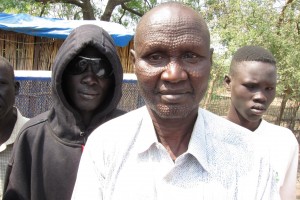 My four-day series on the coming breakup of Sudan in Slate magazine has received good notices from the likes of The Village Voice, The Browser, Bobby Ghosh of Time magazine, Microkhan, and the Wandering Savage.
My four-day series on the coming breakup of Sudan in Slate magazine has received good notices from the likes of The Village Voice, The Browser, Bobby Ghosh of Time magazine, Microkhan, and the Wandering Savage.
In case you missed the tasty 7,500-word opus, here’s a recap:
Part 1: Meet the Bernie Madoff of Sudan
Part 2: Fighting for Freedom in the New Sudan
Part 3: South Sudan: A Million Mutinies Now?
Part 4: South Sudan’s Oil Curse
Since the series began running, the insurgent militia leader Lt. General George Athor, who I quote in Part 3 of the series, has continued his private war in Jonglei state at the cost of some 300 lives. I’m posting, after the jump, notes from my January interview with Athor. I’ll reserve comment except to say the statements of this former golden boy of the Sudan People’s Liberation Army are extremely self-serving.
That’s all for now. I’m off to write a new chapter of The Black Nile to be included in the book’s upcoming Penguin paperback edition. So much has changed on the Nile this year, and so much of if for the better, that I felt the book needed an update.
LT. GENERAL GEORGE ATHOR, SPLA RENEDAGE IN JONGLEI.
1/25/2011, 7:30 pm KRT time.
* Claims SPLA attack on his forces at Pateo, near Pibor, with seven dead.
* Denies receiving aid from Khartoum
* Says Gabriel Teng is preparing for renewed conflict with SPLA over SPLA refusal to absorb Teng’s forces.
The referendum has gone beautifully. The voting was free and fair.
The future of South Sudan is very gloomy. The SPLM is not competent to rule the south.
This peace agreement is not holding.
They have sent a force 85 kilometers away to fight me. [Won’t give his location but says SPLA forces are in Ayod.]
Today they fought my forces in Pibor. [Later gives more specifics: seven dead and four injured in Pateo, near Pibor. In addition, says his forces have been prevented from assembling at Wankay.]
The south will not succeed under these conditions. There will be a civil war.
Our intention was not against the referendum. That’s why we laid down arms, to ensure the referendum.
We were forced to take up arms and defend our home. [I believe this is the royal ‘we’.]
I won the election. They rigged my vote.
We signed the peace agreement. They are violating it.
When we came to power in 2005 our people strayed from the principles of freedom, democracy and liberation.
They will try to cling to power for the next ten years or so.
[Says he grew concerned over the conduct of the government and the army.] When I brought this up, they began do doubt me.
[Why resort to arms? What kind of example is that?] We have tried our best. Many of our brothers and sisters tried. We contested; we went to court and it was in vain. The judiciary are not independent.
If they had not attacked me in my home area – that is how the war started.
[Aid from Khartoum?] If that was the case I would not have allowed the referendum to go through. I never went to Khartoum. I will never sit down with Khartoum.
The helicopter is from a civil aviation company. Most people get their supplies either from neighboring countries or from Khartoum. The helicopter had 35 bags of sorghum.
When they captured it they didn’t find anything. If there was guns and ammunition they would have displayed it.
[Gatlual Gai] We had been with Gatlual Gai until the last moment when he refused to sign the ceasefire. The first bullet was fired at my house in KhorFlus. They also attacked Gatlual Gai.
The demand of Gatlual Gai was that the governors of Unity and Jonglei be removed. Those are not my demands.
Our principle is that we should not spoil our name from getting arms from Khartoum. Maybe he [GG] received help after he split from me.
[Gabriel Teng] SPLA told him they would not accept integration. He is organizing and wants to fight the SPLA.
He only wants integration. He is not demanding anything. Gabriel Teng has a big force. Some in the JIU, some in Khartoum. Teng is trying to solve his problem. It is a fight to be recognized.
[Isn’t SPLA already too big?] You can lay some off and integrate some. Lives are at stake.
[Claims he demanded nothing for himself in ceasefire negotiations. Wanted only integration of forces (didn’t he earlier refuse to integrate?); free elections, constitutional convention, etc.]
I am not interested in going into the army again. In the army you cannot talk. You are tied down.
Government? Why not? I have not asked for any position. I can stay in my house and be elected if there are free and fair elections. I am very popular.
We need an independent body to organize the elections.
[Kuol Manyang] We are friends. I was the one who rescued him from battle in 1993. I, personally, with my hands. He was wounded and I helped him get out. Ayod, March 1993. He was injured in his ribs.
[SPLM] People are hungry for wealth. People are hungry for power. How can you try to suppress the people you were liberating?
END

On p. 174 of *The Black Nile*, you quote the origin of the word *dinar* as *dinare*.
http://en.wikipedia.org/wiki/Dinar
See also Lewis and Short’s Latin dictionary.
Do you mean *denarius*?
Good book. I’m enjoying it.
Jim